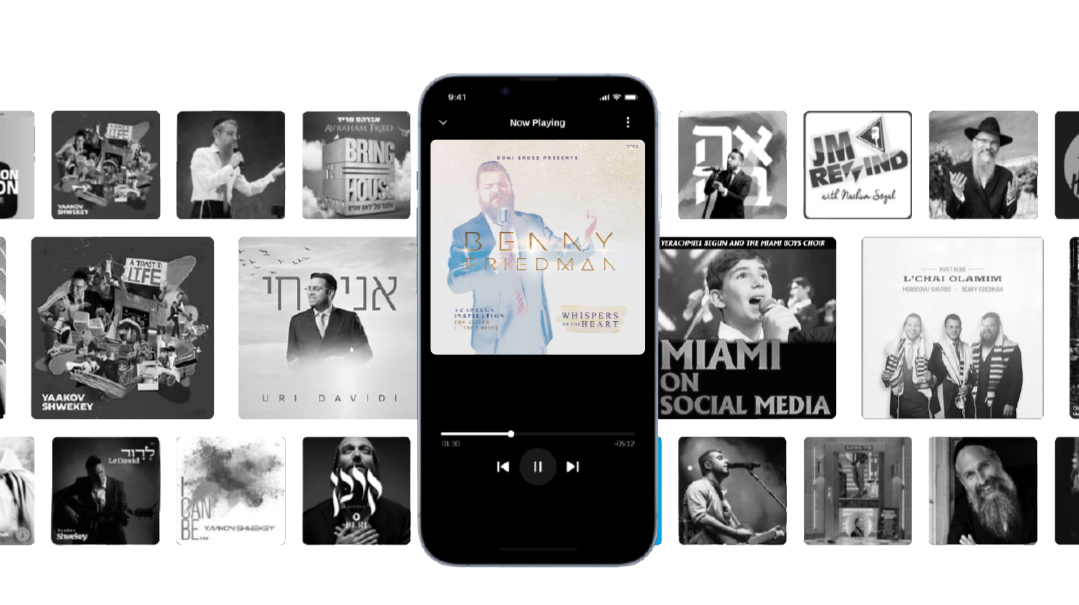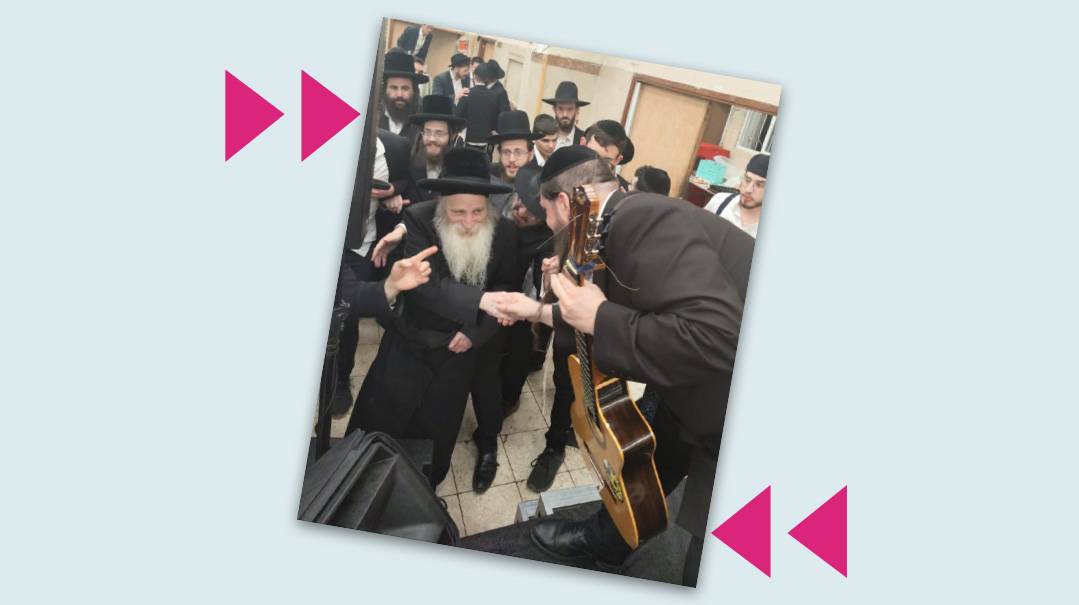Streamlined
| July 30, 2024As we find ourselves in the saddest time of the Jewish year when music is off-limits, some frum listeners turn to a cappella

Streamlined
For the 24Six kosher streaming app, summer listening is always harder to track. As thousands of kids are using their devices offline while in camp, the data on what music and how much music they’re listening to is only traceable when they reconnect sporadically or after the summer.
As we find ourselves in the saddest time of the Jewish year when music is off-limits, some frum listeners turn to a cappella recordings to set the mood. 24Six has an a cappella mode, where the app can be set to play only a cappella songs and stories. And while tracking popularity in the summer isn’t always accurate, it seems that the most popular a cappella choices these days are Simcha Leiner’s recently released SHIREI NECHAMA, and Benny Friedman’s WHISPERS OF THE HEART, together with Ari Goldwag’s two distinct series of non-music albums. A CAPPELLA SOUL has a mix of both upbeat and slow songs, while the DARKNESS TO REDEMPTION series is more introspective and contemplative.
“The Soul set is more attuned to the atmosphere of Sefirah, where the anticipation of counting up to receiving the Torah coexists with the sadness of the deaths of Rabi Akiva’s students. Darkness to Redemption is always released at this time of year, during the Three Weeks, when we are all mourning and yearning for the Beis Hamikdash and the ultimate Geulah and nechamah,” Ari explains.
The cover of this year’s new Darkness to Redemption album has a picture taken at the “Shaar Hachashuch,” or The Dark Gate, one of the 12 gates inside Jerusalem’s Old City that open up to the Temple Mount. This shadowy shaar, like the others, offers a view to the inside of Har Habayis and the Muslim golden dome, but Ari has replaced it with a picture of the Beis Hamikdash. Like many artists, he says that throughout this turbulent and tragic year he has seen listeners more than ever turn to meaningful songs about our faith in redemption.
The collection — the fifth in the series — opens with Tai Gerszberg’s contemporary English song “Ani Maamin,” then moves onto Ishay Ribo’s “Atah Zocher” (composed by Heshy Weinberger) and his “Porchim Leshuvam” about hostage return. It continues with the classic Carlebach “Nachamu Ami,” hit songs by kumzitz songwriters Eitan Katz and Naftali Kempeh, and Yitzy Bald’s “Eich Nashir.” There’s “Aderaba,” about seeing each other’s good qualities, and a new song Ari composed, called “Tzion.”
“I was thinking about the pasuk ‘Tzion b'mishpat tipadeh,’ in the light of all the injustice perpetrated against us today,” Ari says. “We can anticipate the Geulah as the time when truth and justice will finally prevail all over.”
On his first a cappella album back in 2012, Ari says he used his voice as percussion (beatboxing) in the backing tracks, but he’s now moved away to a purer voice-only sound. “If it’s too much like music, it misses the point, and I don’t feel it hits the spirit of the times,” he says. “Music is a medium to move people and we’re trying to move into the right place.”
While other vocalists join Ari for duets, his own versatile vocals provide both lead vocals and backup, and Ari has decided to keep it as authentic as he can. “For a while, I was singing the bass notes of the vocal backing track and using pitch correction to lower it an octave, so that it sounded very deep. Now I’ve decided not to manipulate it, so I’ll sing the lowest I can, which is E flat or D — that’s a baritone, not a bass, but it works.”
Uri Davidi is also known for his a cappella music, with ANI CHAI recently picking up traction on the charts. He says he’s drawn to a cappella in his listening tastes, too. “Music can sometimes detract from or overwhelm the emotion felt in the vocals, which is why a cappella feels more real to me,” he says. “When it’s done right, it’s special.”
Uri has produced a cappella versions of some of his popular songs, as well as selecting those that fit the mood of Sefirah and the Three Weeks, such as “We Will Sing Again” and “Hinei Hageulah.”
Just Out
New Releases, fresh takes
The man who sang “It’s gonna be the little kinderlach who make Mashiach come…” is reaching out to a new generation of kinderlach with a new single for the times. Entitled “DON’T BE AFRAID!” and produced by Country Yossi together with Heshy Walfish, the upbeat song has uplifting lyrics aimed to comfort and reassure kids on both sides of the ocean during turbulent times.
“There’s a whole generation of innocent children who suddenly have to cope with the difficulties of war-related stress and anxiety,” Yossi Toiv points out. “While parents instinctively shield their children from the graphic images and disheartening news of the war, most inevitably sense that something frightening is going on.
“They may have nightmares and suffer other symptoms of stress and anxiety. Some children are receiving counseling and undergoing therapy. I wrote this song to reassure all of Hashem’s kinderlach — both young and old — that He loves and cherishes us, is constantly watching over us, and that everything will turn out fine.”
While the catchy tune with the words “Hashem doesn’t slumber, Hashem doesn’t sleep, Hashem made us a promise you know He’s gonna keep, to watch us and protect us, until the end of time, sing od avinu od avinu chai…” sounds like a cute pep song for kids, adults can feel free to tune into the positive energy and hope as well. Am Yisrael Chai!
Story Behind the Song
Focus on Forward
Years ago, YITZCHAK FUCHS was sitting in his silversmith shop in Meah Shearim on a particularly rainy day. “It felt like being on a boat in a storm, water was pouring down the glass, and there were no customers,” he remembers. Suddenly, a lone customer from Belgium came in. Yitzchak began to converse with him, and was struck by a gem of advice the man offered in conversation: “Gei nohr mit a shtarkkeit, noch un noch un noch….” He wrote it down on a piece of paper and put it away for some future possible lyrics.
Yitzchak eventually did write “Shartkayt,” the mesmerizing tune for those words, which loops around and around and keeps bochurim dancing for hours. It was included on his most recent album Mizbach Adama, released just before Rosh Hashanah last year. But with the war on just three weeks later, it’s become an encouraging message of conviction and not buckling under weakness, no matter what you’re doing.
Songs that Give Me Chizuk
During these months of ongoing war and terror, what songs are you turning to?
I find myself singing the powerful “Retzoneinu Liros es Malkeinu,” sung by Avraham Fried on Keep Climbing. When Klal Yisrael stood at Har Sinai and Moshe Rabbeinu came down to them with the word of Hashem, their answer was, ‘We want to see our King,’ to hear from the Ribbono Shel Olam Himself. During this time of hester panim and darkness, we are all, more than ever, crying out for the same thing. We want to see Hashem’s presence and we want His glory to shine over the world again.”
—Yitzy Waldner
(Originally featured in Mishpacha, Issue 1022)
Oops! We could not locate your form.






